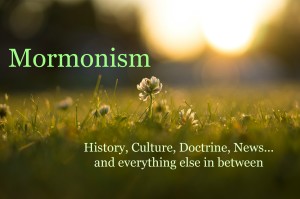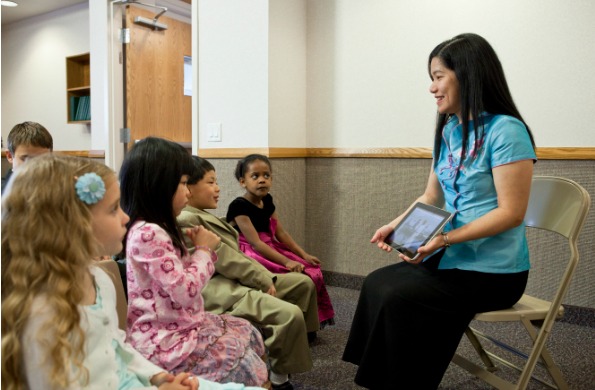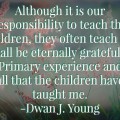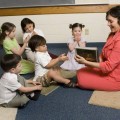This article was previously published on Latterdaysaintwoman.com
People sometimes ask how I end up with so many moving moments in my Primary classes–or so many humorous ones. I’m not a talented Primary teacher, but I am an experienced one and I’ve learned some things over the years that cause people to mistake experience for talent.
When I first started to teach Primary as a teenager new to the Church, I would look over the lesson and mentally cross out large portions of it as being too hard for my preschool students. I wondered what the Church was thinking in discussing things so hard for little children to understand.
Nothing is too hard for Primary Children
 Many years later, I taught a class of preschoolers in which most of the children had at least one non-LDS parent and many of them had a semi-active LDS parent, as well. For most of them, everything I taught was new to them. However, while I was busy trying to make the class “fun” and keeping it as simple as I thought it needed to be, they were busy gaining testimonies. While they gained them, their curiosity about the gospel grew and they began to ask me hard questions. My simple Primary answers weren’t enough. They wanted more. Gradually, I learned to give them what they really wanted–a spiritually powerful lesson that dug deeply into the gospel they were learning to love.
Many years later, I taught a class of preschoolers in which most of the children had at least one non-LDS parent and many of them had a semi-active LDS parent, as well. For most of them, everything I taught was new to them. However, while I was busy trying to make the class “fun” and keeping it as simple as I thought it needed to be, they were busy gaining testimonies. While they gained them, their curiosity about the gospel grew and they began to ask me hard questions. My simple Primary answers weren’t enough. They wanted more. Gradually, I learned to give them what they really wanted–a spiritually powerful lesson that dug deeply into the gospel they were learning to love.
I began to change the way I taught Primary forever. While the lessons were still fun, I learned that just learning the gospel was also fun. I didn’t need to be so entertaining. I didn’t need snacks or fancy crafts. I could have games, acting, flannel boards, and puppets–but a limited number of them, and always with the intent of teaching the gospel, not for entertainment. What I needed was to spend the week studying the gospel principle in-depth and thinking about it, so I could share with them what I was learning, increase my testimony, and answer their questions.
Encourage Serious Questions from Your Primary Students
I began to value questions in a way I never had before. Today, when so many people are accusing Mormons–incorrectly–of not being allowed to ask hard questions, it is essential that we teach our Primary children that God wants us to ask questions. They need to know this before they are doubting teenagers. The gospel restoration started with the question of a fourteen-year-old boy. A person who feels safe asking hard questions is less likely to leave the Church–as long as we teach them how to approach questions in a faith-based manner, and Primary is the place to start the process.
This year, I have set a goal to teach my students that questions are important. It isn’t the question–it’s what we do with it. When we approach it from a faith-based perspective, questions are wonderful, important, and testimony building. Each week I ask my students if they have any questions for me. Often their questions are off-topic: How old are you? What is two plus two? Are you a grandma? Why is the sky blue?
I answer their questions anyway. I want them to feel my love for their curiosity so that if they have a gospel question, they will feel safe asking it, and they do. We discuss a lot of important questions in our class.
 I encouraged the children I teach to ask questions about what we’re learning. When I teach Senior Primary, I am especially encouraging of questions. Even the hard questions–even the ones that hint that a child is beginning to question his faith–I answer them all with respect, not condemnation. I stop the lesson and we dig in. If they express doubts, I congratulate them for having the courage to say so and for taking that question to a person who has a testimony, instead of to a world that doesn’t understand God. And then we talk about it.
I encouraged the children I teach to ask questions about what we’re learning. When I teach Senior Primary, I am especially encouraging of questions. Even the hard questions–even the ones that hint that a child is beginning to question his faith–I answer them all with respect, not condemnation. I stop the lesson and we dig in. If they express doubts, I congratulate them for having the courage to say so and for taking that question to a person who has a testimony, instead of to a world that doesn’t understand God. And then we talk about it.
We’ve spent long periods of time answering a child’s questions on why women don’t have the priesthood (yes, in Primary), addressing the reasons a nine-year-old who didn’t join the church with her family was unsure it was right for her, and on trying to better understand why God lets terrible things happen to children in the world. While I generally try to stay on the lesson topic, if a child’s faith is in danger, helping that is the most important task for the day, and often I can tie it back into the lesson.
I am not afraid of questions. I am a questioner. I thrilled my non-LDS parents with my questions and aggravated everyone else with them. When I began to investigate the gospel, I was surprised to discover everyone welcomed my hard questions. Perhaps I was fortunate, since I know some members have not had that experience. The missionaries treated my questions with great respect and so did my bishop, my home teacher (and later my visiting teachers) and my classroom teachers. Their ability to not feel threatened by my questions strengthened my testimony. I felt secure, knowing that if they weren’t afraid of my questions, it must be because they really did have testimonies.
My secret to a great Primary class? Don’t water down the gospel. Teach the hardest thing the manual has to offer even to the youngest students. If a child asks a hard question, answer it with faith–and teach them how to use a faith-based approach to find their own answers.
The New Youth Program is a Model for Question-based Learning
I love the new youth program. It begins with a question. The youth are taught how to appropriately research the answers from a faith-based perspective. When the program first came out, I was teaching a class of extremely gifted ten-year-olds who wished they were already in Mutual getting harder lessons. I told them we had to teach the lesson in the manual, but we could use the methods of the new Mutual program. They were excited and we went to work. Today, having continued to study the program, I could do this so much better and look forward to getting to try my new ideas one day, but even then, with only a basic understanding at the time, I began to better understand the extraordinary inspiration that led to that program. The children became more involved. They asked hard follow-up questions but our discussions were so powerful as we researched, thought, questioned, and came to a testimony of the question we were answering.

To read more of Terrie’s articles, click the picture.
While every lesson has some questions that have right answers, don’t be afraid to ask some that don’t. Those are the questions that give me the amusing or inspirational things I share with others. Don’t scold if they ask a question that seems critical of the Church. “I love that question. You always ask wonderful questions that really make me think. Let’s see if we can find an answer for you.” Don’t discourage guessing. A wrong guess gives you insights into the child’s mind and heart and shows you where you need to focus. “That isn’t the answer, but it was an amazing guess. It showed you know Heavenly Father always has a plan for us. Your guess is exactly what I used to think when I was younger. Who else has a guess for me?” Let your children be unafraid of guessing.
There is a Primary song that says, “I”ll seek the Lord early while in my youth.” Seeking the gospel is not a shallow, light-weight activity and no child is too young to start digging deep. After all, some of my best insights into the gospel have come from preschoolers!
And that is my personal secret for teaching a great Primary lesson.
About Terrie Lynn Bittner
The late Terrie Lynn Bittner—beloved wife, mother, grandmother, and friend—was the author of two homeschooling books and numerous articles, including several that appeared in Latter-day Saint magazines. She became a member of the Church at the age of 17 and began sharing her faith online in 1992.






